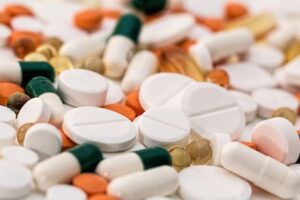If you’re someone who’s been struggling with premature ejaculation (PE) and have been diagnosed with diabetes, you’re probably wondering if the two are connected. Well, you’re in the right place because in this article we’re diving deep into the topic and uncovering all the facts.
Dealing with diabetes can be a real challenge, and when a sexual dysfunction like premature ejaculation is thrown into the mix, it can feel like an insurmountable obstacle. But don’t despair! ShagLonger will dig deep to help you understand the relationship between these two conditions and provide you with strategies for managing them. So, let’s get into it and answer “Can diabetes cause premature ejaculation?”
What is diabetes?
Diabetes Mellitus is a chronic disease characterized by high blood sugar levels. The body uses insulin, a hormone produced by the pancreas, to regulate blood sugar levels. In diabetes, the body is either not producing enough insulin or the cells in the body are not responding properly to insulin, leading to high blood sugar levels.
Types of Diabetes
There are two main types of diabetes: type 1 and type 2.
- With type 1 diabetes, the body’s immune system mistakenly attacks and destroys the cells in the pancreas that produce insulin. This means that people with type 1 diabetes have to take insulin injections to control their blood sugar levels.
- Type 2 diabetes is the most common form of diabetes and it’s usually diagnosed in adults, although it’s becoming more common in children as well. With type 2 diabetes, the body’s cells don’t respond properly to insulin, a condition known as insulin resistance. This can be caused by a combination of genetic and lifestyle factors, such as being overweight or obese, having a sedentary lifestyle, or eating an unhealthy diet. In type 2 diabetes, the body may also not produce enough insulin, or the pancreas can’t keep up with the body’s need for insulin.
It’s important to note that type 2 diabetes is preventable and manageable, and lifestyle changes such as maintaining a healthy diet, regular exercise, and maintaining a healthy weight can help to prevent diabetes or delay its onset.
Symptoms of diabetes
Some common symptoms of diabetes include increased thirst, frequent urination, and fatigue. Other symptoms can include blurred vision, slow-healing wounds, and tingling or numbness in the hands or feet. Keep in mind that some people may have diabetes and not experience any symptoms at all.
Risk factors for diabetes
So, when it comes to diabetes, there are a few things that can increase your risk of developing it. One major risk factor is being overweight or obese. Carrying extra weight, especially around your midsection, can make it more difficult for your body to use insulin properly, which can increase your risk of developing type 2 diabetes.
Another risk factor is a lack of physical activity. Leading a sedentary lifestyle can make it harder for your body to use insulin properly, so staying active is important in preventing diabetes.
Family history is also a risk factor. If someone in your family has diabetes, your risk of developing it increases.
Age is another risk factor, as the risk of developing diabetes increases as you get older. Also, some ethnic groups have a higher risk of developing diabetes than others.
But it’s important to remember that diabetes is a preventable and manageable disease (especially type 2). Making lifestyle changes such as maintaining a healthy diet, regular exercise, and maintaining a healthy weight can help to prevent diabetes or delay its onset.
So, if you have any of the risk factors, it’s a good idea to talk to your doctor about ways to reduce your risk.


How diabetes can affect sexual function
We talked earlier about how diabetes is a chronic disease that affects the body’s ability to produce or use insulin. Well, it can cause a lot of problems, including sexual function.
High blood sugar levels can damage the blood vessels and nerves in the body over time, including those that control sexual function. This damage can lead to a range of sexual dysfunctions, such as premature ejaculation or erectile dysfunction. We will dive into the link between them below.
The correlation between diabetes and erectile dysfunction
Diabetes is one of the most common causes of erectile dysfunction, which is the inability to achieve or maintain an erection. The damage caused by diabetes to the blood vessels and nerves can affect the ability to achieve an erection. Having erectile dysfunction can be a risk factor that could lead to premature ejaculation.
Check out this article to see the differences between ED and PE
The effects of diabetes on the nervous system
Diabetes can affect the body in so many ways, and one of those ways is the nervous system. When you have diabetes, your body can have a hard time regulating blood sugar levels, and over time, this can cause damage to the nerves.
And when it comes to our sexual organs, well, those nerves play a big role in how everything functions down there. So, if those nerves are damaged, it can make it harder for them to transmit signals properly, which in theory could potentially lead to problems like premature ejaculation.
The relationship between diabetes and decreased testosterone levels
In men, diabetes can lead to decreased testosterone levels, which can have a number of negative effects. For example, low testosterone can cause problems with sexual function, such as a decrease in sexual desire and premature ejaculation. It can also lead to other symptoms like fatigue, muscle weakness, and depression.
It’s important to note that not all men with diabetes will experience low testosterone levels. But, it’s still a good idea for men with diabetes to have their testosterone levels checked regularly, as early detection and treatment can help prevent complications.
The influence of diabetes on circulation and blood flow to the genital area
We highlighted earlier that diabetes can lead to damage in the blood vessels throughout the body, including those in the genital area. This damage can cause problems with circulation and blood flow, which can affect a person’s erectile function and make it hard to achieve and maintain an erection. The vascular problem which results from Diabetes Mellitus is also known to result in neurologic disorder. This could be another way it can potentially lead to premature ejaculation.
The link between diabetes and psychological factors
Additionally, the emotional burden of living with a chronic condition like diabetes can also contribute to feelings of stress and anxiety. This can make it difficult to focus on sexual activity and can cause a decrease in sexual desire, which can further contribute to premature ejaculation. Psychological factors like depression is a common cause of pe.
It’s important to note that managing diabetes and its associated psychological symptoms can help alleviate premature ejaculation and improve overall sexual health.


Studies linking diabetes to premature ejaculation
This study looked at the prevalence of PE in men with diabetes and how it affects their sexual function. The researchers recruited 488 men and divided them into two groups: one group had diabetes and the other was healthy.
The group with diabetes had 40.8% of the participants, while the healthy group had 59.2%. The study found that diabetic patients were significantly more likely to have PE compared to healthy men. The study also found that men with diabetes had a mean time before ejaculation of 3.6 seconds, while healthy men had a mean of 4.3 seconds. The study suggests that diabetes might be linked to PE and other sexual problems.
Treatment Options for Premature Ejaculation
The good news is that there are several effective treatments for PE caused by diabetes. In this section, we’ll take a closer look at each of these treatment options, so you can make an informed decision about what will work best for you.
It’s important to keep in mind that every person is different and what works for one person may not work for another, so it may take some trial and error to find the right treatment for you. But with the right approach, you can manage PE and improve your sexual function.
Medications
There are a number of different medications to help premature ejaculation. These can be taken orally or applied to the area. Here are a few of the most popular options:
Serotonin reuptake inhibitors (SSRIs)
Selective serotonin reuptake inhibitors (SSRIs) are a type of medication that is commonly used to treat premature ejaculation. These medications work by increasing the levels of serotonin in the brain, which can help to delay ejaculation.
One commonly used SSRI medication for PE is fluoxetine, it works in a similar way to dapoxetine by increasing the levels of serotonin in the brain, which can help to delay ejaculation. fluoxetine is more widely available and has been used “off-label” for PE treatment.
It’s important to keep in mind that SSRIs may take several weeks to start working and may cause side effects, such as nausea, headaches, and decreased libido. So it’s important to work closely with your doctor to find the right medication and dosage that works best for you.
It’s also worth mentioning that SSRIs are not only used for PE treatment but also depression, anxiety, and other mental health conditions, so it’s important to keep in mind that if you are taking SSRIs for another condition, you should not stop taking them without consulting with your doctor first.


Natural Supplements
A natural supplement like Performer 8 is one alternative to medication for those who are looking for a more natural way to manage PE. It is made of a blend of ingredients like macuna pruriens, ashwagandha, and L-arginine, which are known to have properties that support sexual health and performance. Some of these ingredients have been shown to increase the levels of neurotransmitters in the brain that regulate sexual function, while others may help to reduce anxiety and stress which can contribute to PE.
By using a natural supplement like Performer 8, men may be able to address the root cause of their PE, without the risk of experiencing adverse side effects associated with prescription medications.
Topical Creams
Another medication option to treat PE is numbing creams. These creams can be applied directly to the penis before sexual activity and work by temporarily numbing the nerves in the penis, which can help to reduce sensitivity and delay ejaculation.
The most commonly used topical creams for PE are lidocaine and prilocaine, which are both local anesthetics. These creams can be applied to the head and shaft of the penis, and they work by numbing the nerves in the area, which can help to reduce sensitivity and delay ejaculation.
It’s important to note that these creams should be used with caution, as they can cause irritation or allergic reactions in some men. Additionally, it’s important to use them with a small amount to avoid side effects, as it can cause a decrease in sensation in the penis and make it difficult to reach orgasm or have a satisfying sexual experience.
Behavioral therapy
Behavioral therapy is a non-medicinal treatment option for premature ejaculation caused by diabetes. The main goal of behavioral therapy is to help men learn to control their ejaculation and improve their sexual function.
The “squeeze technique”
The squeeze technique is one of the most popular behavioral therapy techniques. This technique involves identifying the sensations leading up to ejaculation and then squeezing the head of the penis just before ejaculation occurs. This can help to interrupt the ejaculation process and delay it.
Stop-start technique
Another technique is the “stop-start technique” which involves stopping sexual activity just before ejaculation, and then starting again after the sensation subsides. This technique helps men to become more aware of their physical sensations and develop better control over them.
Relaxation techniques
Behavioral therapy also includes learning to relax and focus during sexual activity. This can help to reduce anxiety and improve sexual function. Relaxation techniques such as deep breathing, yoga, or meditation may help reduce stress to last longer in your sexual encounter by being more present in the moment.
Pelvic exercises
Pelvic muscle or “kegel exercises” can also help PE. These exercises can help to increase control over ejaculation by strengthening the muscles in the pelvic area. These exercises, also known as Kegel exercises, can be done at any time and can help to improve both sexual function and overall health.
Behavioral therapy can be an effective treatment option for premature ejaculation but it’s important to note that it may take time to see results.
It is also important to work with a therapist or counselor who is trained in sexual therapy and can guide you through the process. With dedication and perseverance, many men have been able to improve their sexual function and enjoy a more satisfying sexual experience using behavioral therapy.
Lifestyle changes
Making lifestyle changes can be a powerful tool in managing both premature ejaculation (PE) and diabetes. In fact, many of the lifestyle changes that can help with PE caused by diabetes can also help to improve your overall health and well-being.
Quit smoking
Let’s start with quitting smoking. Smoking is not only bad for your overall health, but it can also cause damage to the blood vessels and nerves in the body, including those in the penis. Quitting smoking can help to improve blood flow, reduce inflammation, and improve sexual function.
Stress reduction
Next is reducing stress. Stress can have a negative impact on both diabetes and PE. When you’re stressed, your body releases hormones that can make it harder for your body to use insulin properly, which can lead to higher blood sugar levels. Stress can also cause anxiety and make it harder for you to relax and enjoy sexual activity. Finding ways to relax and manage stress, such as through meditation, yoga, or therapy, can be very beneficial. Using these techniques can help you mentally overcome premature ejaculation.
Healthy diet and exercise
A healthy diet and exercise routine are also essential in managing diabetes and PE. Eating a diet that is rich in fruits, vegetables, whole grains, and lean protein can help to keep your blood sugar levels in check and improve your overall health. Regular exercise can help PE by improving blood flow and reducing inflammation, which can help to improve sexual function.
Good sleep hygiene is also important. Getting enough sleep is essential for good health and can help to reduce stress and improve overall well-being. Lack of sleep can actually cause PE, ED, and other sexual dysfunctions so prioritize how many hours you get each night.
Additionally, avoiding alcohol and recreational drugs can also help to improve sexual function and reduce PE.
Overall, making lifestyle changes can be a powerful tool in managing both diabetes and PE. It can help to improve blood flow, reduce inflammation, and improve overall health and well-being. It may take some time to see results, but with dedication and perseverance, many men have been able to improve


Summary
In conclusion, diabetes can indeed cause premature ejaculation, as high blood sugar levels can damage the blood vessels and nerves in the body, including those in the penis. However, it’s important to note that type 2 diabetes is a preventable and manageable disease, and making lifestyle changes such as maintaining a healthy diet, regular exercise, and maintaining a healthy weight can help to prevent diabetes or delay its onset.
When it comes to treating PE, there are several effective options available such as medications, behavioral therapy, lifestyle changes, and in rare cases, surgery. It’s important to work closely with your doctor to find the right treatment for you and to remember that every person is different and what works for one person may not work for another.
With the right approach and a little bit of patience, you can manage PE and improve your sexual function. Don’t hesitate to talk to your doctor if you have any concerns about PE or diabetes. Remember, you’re not alone in this and there is always help available.










